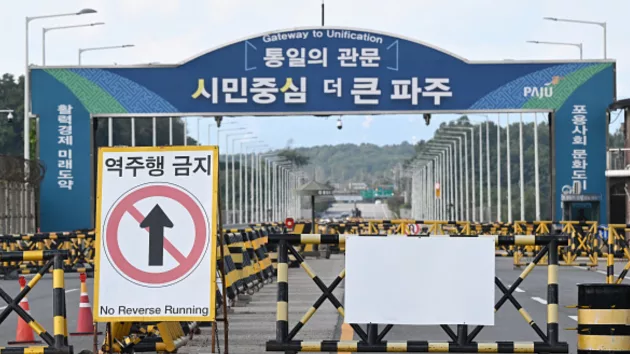(SEOUL) — A North Korean defector living in South Korea is under arrest for allegedly stealing a bus and attempting to drive it across the border into North Korea last week, police said.
The man, who is in his 30s, escaped North Korea and settled in 2011 in Seoul, according to South Korea’s Gyeonggi Bukbu Provincial Police. Reportedly, he told police that he wanted to return to North Korea because life was difficult in the South and he missed his family back in the North.
He was not the first North Korean defector who has attempted to return home. South Korea’s Unification Ministry said 31 defectors re-entered the North from 2012 to 2022, an average of about three each year. The ministry’s report revealed that 71% of the defectors who reentered North Korea resided in the South for less than five years.
“The few North Korean defectors who wish to reenter North Korea seem to have failed to adapt to the very different environment in the South,” Dr. Shin Dae-jin, principal researcher at the Sungkyunkwan University Center for Good Democracy, told ABC News. “Also there are elderly defectors who wish to return because they miss their hometown so dearly.”
The man allegedly tried to cross the Tongil Bridge in Paju, which leads to the fortified inter-Korean border, ignoring the warnings of soldiers. He was eventually stopped by military forces guarding the bridge and handed over to police. The police issued an arrest warrant last Friday after an investigation on charges of violating the National Security Act and the Military Base Protection Act, vehicle theft and driving without a license.
Although its society is generally democratic and capitalistic, South Korea welcomes North Korean defectors by providing basic education at the adaptation center for months before letting them walk out freely into society. But the reality of adapting to a new way of life isn’t always easy for the defectors.
According to North Korean Refugees Foundation research last year, North Korean defectors earn approximately $460 less in monthly income than others in South Korea. Research center Seoul Institute’s report revealed last year that 37.7% of North Korean defectors living in Seoul are welfare recipients, which means their income does not meet the minimum cost of living.
“North Korean defectors often face economic and psychological difficulties, unable to find employment after receiving one-time subsidies provided by the government,” Lawmaker Han Jeoung-ae who takes part in the National Assembly’s Foreign Affairs and Unification Committee, told ABC News. “The government must provide more practical support for employment and housing, and psychological and social support if needed.”
Experts pointed out that only a handful of defectors attempt to reenter North Korea.
“There are misfits in any society; the defectors who wish to return are like immigrants who wonder if their lives left behind could have been better off,” Kwang Baek Lee, who represents a news outlet that targets North Korean people, told ABC News.
But many defectors who risked their lives to cross the fortified border find their new lives a second chance.
“I am grateful for the life I have in South Korea, that I get paid for the work I have done, the choices I have at the market, that I can have three meals a day and when I return home from work I get to watch the television,” Hyukpil Lim, a defector in his 60s who makes a living by cleaning apartment garbage grounds, told ABC News.
According to South Korea’s Unification Ministry, 34,183 North Korean escapees took root in South Korea until June this year. More than 1,000 people escaped and settled down before 2020, but COVID-19 made the escape route even more difficult, resulting in a dramatic decrease to 63 people in 2021, 67 in 2022 and 196 in 2023.
Meanwhile the budget for supporting North Korean defectors this year decreased by $3.3 million compared to last year.
Copyright © 2024, ABC Audio. All rights reserved.

